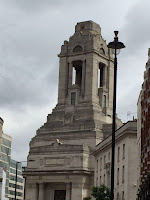 |
| ( From top to bottom) Churchill's Plaque and Freemasons Hall- visited on June 14th. |
'To think you can make a man richer by putting on a tax is like a man thinking he can stand in a bucket and lift himself up by the handle'
For the next years Churchill would embrace his new position as a member of the cabinet and even became the President of Board of Trade and worked with David Lloyd George, the chancellor at the time and soon to be PM (1919-1922). However the years from 1922-1929 where tough ones for Churchill as he re-joined the Conservative party after the Liberals were defeated suggesting that he had 're-ratted' back to the party. Subsequently this led to many viewing him as a traitor and right wing extremist. Despite all of this Churchill was seen to redeem himself throughout one of the toughest years Britain had to face as a country, 1939-1945. He was critical of the PM at the time; Neville Chamberlain who was following a policy known as appeasement (essentially giving Germany what they wanted to stop Hitler from going to war)
3rd September 1939 one of the most symbolic dates in history, Britain declared war on Germany. Churchill was delegated a seat in the War Cabinet and became the first lord of Admiralty. He'd attempt to advise Chamberlain on how to deal with German threats but they were ignored which left the country loosing confidience with there PM. Churchill was appointed Prime minister on May 10th 1940. The next five years Churchill would put in 'blood..toil..tears and sweat..' into ensuring that Britain would triumph and win the war. And on May 7th 1945 Germany surrendered.
 |
| Churchill at his victory parade- showing the Peace sign to signify triumph. |
Visiting the statue of Churchill which is situated in Parliament Square resembles the significance of the political figure. Not only is it the biggest statue there, placed at the entrance to the square it is in a spot that Churchill described himself as 'where my statue will go'. The statue overlooks Parliament which show his political importance towards the building.
The statue resembles the ideology of Nationalism well as it illustrates the belief that the nation is the most important aspect in society. This is because during the war the welfare of the nation and keeping Britain standing was the only thing on Churchill's mind. Churchill has become a powerful symbol for what Britain stands for therefore in itself Churchill represents the idea of Nationalism pretty well.
 |
| Picture with Churchill in Parliament Square. |
'Success is the ability from going from one failure to another with no loss of enthusiasm'


No comments:
Post a Comment